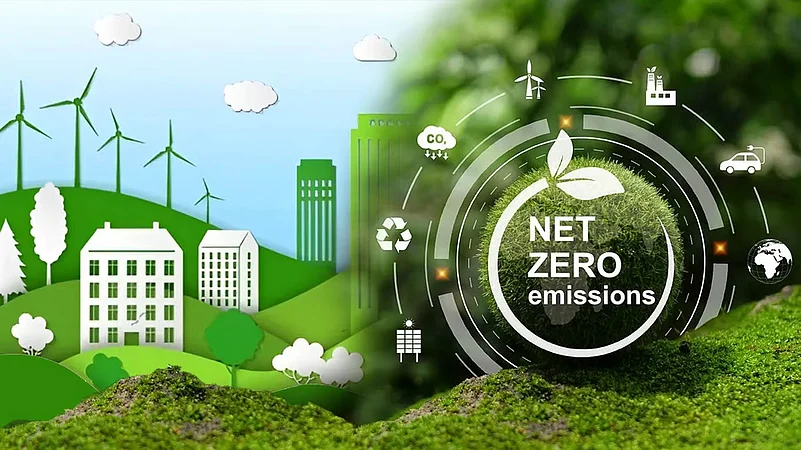On August 15th this year, delivering the Independence Day speech from the ramparts of Red Fort, Prime Minister Narendra Modi underlined the need and importance of ‘green jobs’ in the country as a part of meeting India’s Sustainable Development Goals. He also spoke about the country’s focus on ‘generating sustainable employment opportunities’ in the sectors of climate conservation and renewable energy.
According to a definition by the International Labour Organisation, ‘green jobs’ are essentially those that contribute to preserving or restoring the environment in both traditional as well as emerging green sectors. These jobs help improve the efficiency of energy and raw materials, limit greenhouse gas emissions, and protect ecosystems.
India has the potential to create 35 million green jobs by 2047, according to a report by the Skill Council for Green Jobs and Sattva Consulting, with support from JP Morgan, titled "Gearing up the Indian workforce for a Green economy." The study, unveiled last year, highlights key sectors such as renewable energy, waste management, electric vehicles, sustainable textiles, and eco-friendly construction that will spearhead the growth of green jobs in the country.
But before they qualify for green jobs, workers and students who might potentially be a part of this sector need to be skilled and trained in green practices. The education system has to play a major role in ‘greening’ the curriculum. The New Education Policy (NEP) unveiled in 2020 emphasized the importance of sustainability education in achieving India’s Sustainable Development Goals.
Greening the Curriculum: The Role of Education
Target 7 of the United Nations' Sustainable Development Goal 4 (SDG 4.7) on Quality Education calls for "all learners to acquire the knowledge and skills needed to promote sustainable development." This target aligns with the growing emphasis on sustainability within the Indian education system. However, significant gaps remain in integrating these goals into curriculums across educational institutions.
“We need to look at how we can train students in schools and colleges for green and sustainable education,” says Prof. Somak Raychaudhuri, Vice Chancellor of Ashoka University, addressing the 6th International Conference on Sustainability Education in Delhi. The conference sparked discussions among academicians and practitioners in the sustainability space about the future of ‘greening’ the education system. One major theme was adopting international best practices in sustainability education and adapting them to the Indian context.
A strong undercurrent in these discussions focused on preserving India’s historically sustainable ways of living and incorporating those traditional practices into modern curricula. Experts stressed that community-level practices and village-based climate change management activities should be amplified in educational content.
NEP 2020 and Green Jobs
The National Education Policy 2020 proposes the inclusion of sustainable development and living into the education system, with an emphasis on training and skilling students for green jobs. However, academicians point out that while the NEP has great ideas on a ‘green’ curriculum, “it does not tell you the road to get there.”
Prof. Raychaudhuri explains that while NEP 2020 is packed with recommendations, not all are universally adoptable. “The framework’s focus on gaining practical knowledge through internships is one of the strong points,” he adds.
Academicians widely advocate for credit-based courses in community engagement, environmental education, and value-based learning in all Higher Education Institutions (HEIs). However, challenges remain in finding qualified educators. “Who will teach all of these things in Indian universities? First, we need to build the generation of teachers,” says Prof. Raychaudhuri.
This echoes the challenges faced when NCERT introduced compulsory environmental courses, only to struggle in finding adequately trained teachers. While the NEP implementation has begun in several universities, it has yet to reach grassroots levels effectively.
“Green education necessarily refers to internalizing the environment into the curriculum,” says Dr. Ram Boojh, advisor at Mobius Foundation and a former Climate Change specialist at UNESCO. He stresses that sustainability awareness must start in early childhood education, forming the foundation of a greener future workforce.
The Academia-Industry Gap
Both academicians and industry practitioners agree that a considerable gap exists between the knowledge and skillsets that academic courses offer and what businesses need to make their processes sustainable.
Educationist and former NASSCOM President Dr. Kiran Karnik points out this ‘gap.’ “In businesses, they look at sustainability from the point of business returns. It’s more about CSR, the company’s annual report, and associated marketing strategies. However, core industries should also look at integrating sustainability into their business practices,” he explains.
Dr. Karnik believes that business schools should step in to bridge this gap. Over the past two years, many business schools have started recruiting sustainability experts to teach specialized courses. Academicians feel that as the supply of ‘green-skilled’ manpower improves, industry confidence in sustainability-trained professionals will grow.
For this to happen, it is essential that textbook definitions of sustainability are translated into practical realities that businesses face, adds Dr. Kumudhini Ravindra, a business transformation leader based in Bengaluru.
Clearly, the journey ahead to ‘green’ the education curriculum will be a marathon, with all stakeholders – academia, industry, and policymakers – running the race together.
































